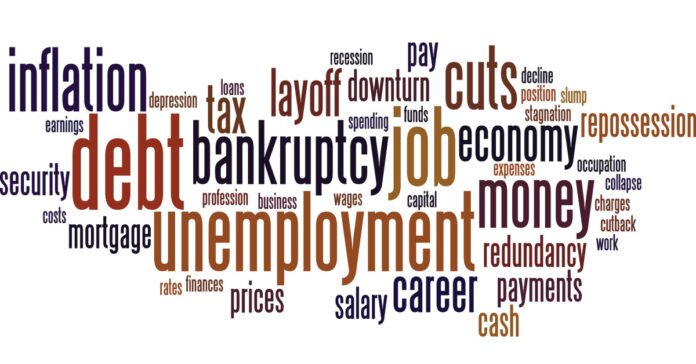Earlier this week, the government reported that the rate of inflation fell, and stock markets rejoiced, thinking the era of rising interest rates and Fed hikes is over. But is it? Or is this just a valley in a chart with many peaks and valleys?
Also, it’s important to note that while some headlines may have given you the impression that inflation is down, that’s not true. Inflation is still rising, just more slowly than it did this summer. So while you can expect more prices to hold steady or rise more slowly, don’t expect many of them to drop. Cars, rent and home prices may fall, but is that because inflation is slowing, or because we a recession is looming? The mainstream media and government economists will report the former, but there are many who feel we are heading into a recession.
While we celebrate the so-called good news about inflation, let’s not forget the bad news: the U.S. deficit and total debt continue to grow.
Debt Weighs you Down
When I first graduated college and lived in New York City, I was making $16,500 per year and spending at least $20,000. That’s not a good position and it can’t last for long. To keep my head above water, I would transfer the balance from one credit card to another that offered me a “special promotional rate” on balance transfer. Not only did that lower my balance, it meant I didn’t have to pay the first card with my own money that month. This kiting of balances didn’t solve the problem, but it gave me another 30 days of breathing room.
The next year, I got a raise and made $19,000, but my costs kept rising. I eventually took a $5,000 personal loan to pay off my credit card debt. That helped, but not for long because the banks just kept extending me credit, I kept spending more than I made, and the debt just kept piling on. I carried a credit card balance of 10 to 20 percent of my annual income for the better part of fifteen years. I wasn’t able to pay it off until a side gig I started became a profitable business.
The United States government is in a similar debt predicament, but six magnitudes worse. Instead of borrowing 20 percent of their income, they have borrowed about 120 percent. That’s like having credit card bills and car payments that add up to $120,000 when you make only $100,000 per year, and then doing it again next year.
Government Drowning in Debt
In other words, the government is in far worse economic shape than I ever was. It owes in excess of $33 trillion and the number is climbing by about $2 billion per day. The government is spending a trillion ($1,000,000,000,000) of our tax dollars this year just to make its interest payments, and the interest rates are rising. Instead of paying off the debt, the government just keeps piling it on. Rinse and repeat; it’s a never-ending cycle of more borrowing, growing debt, and higher interest rates.
If the government were a company, it would be desperately selling off property, divisions, and product lines to raise funds so it won’t be forced to file for bankruptcy. (Think of how Sears sold off the Craftsman brand and how companies sell their store locations to raise cash and then lease them back.)
The government isn’t taking any of these actions because institutions, countries and even individuals continue to buy their debt. But one day, someone will realize the emperor has no clothes and the whole house of cards will come tumbling down faster than Humpty Dumpty fell off that wall. And just like that egg head, once the U.S. economic system cracks, no one will be able to put it back together again.
This is why the rating service Moody’s has downgraded U.S. debt. By the way, the net result of the downgrade is we’ll have to offer more interest to attract borrowers. But what’s one more nail in our coffin?
International Companies
Don’t think that one day’s, or one week’s, worth of good news is enough to turn things around. Plan for the long-term, prepper for the long run, and invest not for today, but with the future in mind.
We’ve all heard that we should own tangibles to protect us from inflation, and I’ve repeated that advice. But are you going to put your life savings into gold and silver, or brass and lead? I’m going to shift some investment into large, global companies that produce in-demand raw materials because I expect that when the world recovers from a collapse, we will need steel, copper, and oil.
My hope is that large, global companies will survive a collapse, even if they are headquartered in the U.S. and list their shares on U.S. stock exchanges. For example, Exxon Mobil will still own oil fields and will produce oil even if the U.S. defaults or we experience high inflation. If the financial system collapses, shares in Exxon Mobil might become un-tradable for a while because of closed markets or other economic disruption, but I expect they will still have value after a recovery because the company will still hold valuable assets.
Walmart may top the Fortune 500, but what will happen to their business model if they can’t pay for supplies or sell goods because of a financial collapse? (Plus, it’s much easier to loot a store than a coal mine or an oil yard.) Will Walmart still have value after a recovery? Probably, but I am betting it will be less than companies that produce oil and gas, mine or produce minerals, make chemicals and fertilizers, and so forth. Retailers will also be slower to recover because of the supply chain issues.
Diversify your Prepper Investments
If you are a hardcore prepper, focus on tangible assets, from food and ammunition to gold and silver. If you have enough money, invest in a prepper property, like a farm or homestead. But don’t neglect your retirement. Keep pouring funds into your 401k or IRAs. We know we are going to retire one day. We don’t know we’ll have a collapse, a nuclear war, a CME or other disaster. As a guy who retired early, I am not sorry I saved money as well as 5.56 rounds and AR magazines.
The 401k I had with one employer is worth far more than when I left that job in 2002. The #10 cans of food I bought in 2002 are worth far less. You need to balance your approach and diversify your investments so you will come out ahead no matter what happens. Financial survival is important too.
Please keep in mind that I am not a financial advisor or professional and this is not financial advice; I am just a prepper who is sharing his approach to preparedness. Do your own research and consult a financial professional before investing.








